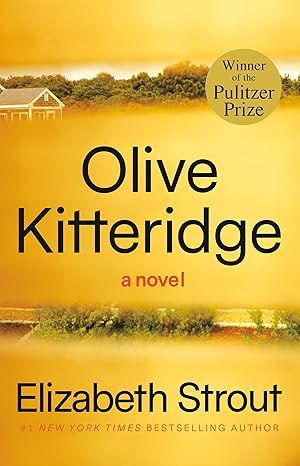Olive Kitteridge
4.2 out of 5
30,647 global ratings
WINNER OF THE PULITZER PRIZE • The beloved first novel featuring Olive Kitteridge, from the #1 New York Times bestselling author of My Name is Lucy Barton and the Oprah’s Book Club pick Olive, Again
“Fiction lovers, remember this name: Olive Kitteridge. . . . You’ll never forget her.”—USA Today
“Strout animates the ordinary with astonishing force.”—The New Yorker
One of the New York Times’s100 Best Books of the 21st Century
A BEST BOOK OF THE YEAR: The Washington Post Book World, USA Today, San Francisco Chronicle, Chicago Tribune, Seattle Post-Intelligencer, People, Entertainment Weekly, The Christian Science Monitor, The Plain Dealer, The Atlantic, Rocky Mountain News, Library Journal At times stern, at other times patient, at times perceptive, at other times in sad denial, Olive Kitteridge, a retired schoolteacher, deplores the changes in her little town of Crosby, Maine, and in the world at large, but she doesn’t always recognize the changes in those around her: a lounge musician haunted by a past romance; a former student who has lost the will to live; Olive’s own adult child, who feels tyrannized by her irrational sensitivities; and her husband, Henry, who finds his loyalty to his marriage both a blessing and a curse.
As the townspeople grapple with their problems, mild and dire, Olive is brought to a deeper understanding of herself and her life—sometimes painfully, but always with ruthless honesty. Olive Kitteridge offers profound insights into the human condition—its conflicts, its tragedies and joys, and the endurance it requires. The inspiration for the Emmy Award–winning HBO miniseries starring Frances McDormand, Richard Jenkins, and Bill Murray
330 pages,
Kindle
Audiobook
Hardcover
Paperback
Audio CD
First published September 29, 2008
ISBN 9780812971835
About the authors
Elizabeth Strout
Elizabeth Strout is the author of the New York Times bestseller Olive Kitteridge, for which she was awarded the Pulitzer Prize; the national bestseller Abide with Me; and Amy and Isabelle, winner of the Los Angeles Times Art Seidenbaum Award and the Chicago Tribune Heartland Prize. She has also been a finalist for the PEN/Faulkner Award and the Orange Prize in London. She lives in Maine and New York City.
Read more
Reviews
Harriet
5
Choosing to live
Reviewed in the United States on June 4, 2012
Verified Purchase
There are many reviews here so I won't be redundant. However, I am surprised to see the negative reviews saying this book is boring and depressing. I found the writing to be some of the most beautiful I've ever read, and that, in & of itself, keeps any part from being boring. I generally have a hard time with short story compilations as I don't like to move on just when I'm getting into a character. However, this book was NOT like that. Ms. Strout pulls you in right away in every story/chapter with her powerfully descriptive writing & strong characters. Also I felt it read more like a novel than a collection of short stories especially since there is one uniting character and so much of it is about that main character.
Additionally, I did NOT find the main character mean and self-centered as several reviewers did. Of course, she had many moments of those traits, but this book is more about her growth and showing that a person is not all one way or the other. I found Olive to be complex, humorous and yes, even likeable at times, especially when she recognized her own shortcomings. And I loved that she could be so rude and brash but yet sometimes she was the one people remembered perhaps for her more honest take on the world. And also in some ways she perhaps cared MORE than many others who may not have been so outspoken or rude. In a nutshell, I found her refreshingly honest and real.
Finally, though many of the stories were sad and had depressing elements, I felt that most of them were truly about choosing to find happiness or strength & persevere in spite of life's hardships. And also how sometimes the little twists and turns & surprises of life can help us to come to terms with it and move on - even, for example, in whether or not to plant the tulips.
Read more
10 people found this helpful
Ann S.
5
Beautiful
Reviewed in the United States on July 19, 2024
Verified Purchase
Beautiful stories and story-telling. Olive may be ornery and critical, but she helped me see that part of me, too, and I felt misunderstood! A very human story. I loved it. I read Amy and Isabelle first, and that motivated me to read this. Same idea: real people, imperfect, trying hard. And the writing - the prose - is just lovely. You can tell the author loves her characters.
Read more
2 people found this helpful
louise a arms
5
Fast delivery
Reviewed in the United States on September 26, 2024
Verified Purchase
Good read
Molly Morgan
5
Great characters
Reviewed in the United States on August 20, 2024
Verified Purchase
LOve this author. She makes you feel the characters prospective on life.
rhodainpgh
5
Hope, Loneliness & Olive Kitteridge
Reviewed in the United States on June 13, 2009
Verified Purchase
I begin with a quote from the 2008 Pulitzer Prize winning Olive Kitteridge: Fiction by Elizabeth Strout:
"...then Olive felt something she had not expected to feel again: a sudden surging greediness for life...She remembered what hope was, and this was it. That inner churning that moves you forward, plows you through life the way the boats below plowed the shiny water, the way the plane was plowing forward to a place new, and where she was needed."
Restoring hope is crucial for couples who fear they've lost their way, for an individual with profound grief who's lost the most important person in their life, or someone who experiences panic attacks for the first time and feels overwhelmingly out-of-control or for all of us who suffer from the loneliness that's part of the human condition. Olive Kitteridge: Fiction is a luminous novel that captures the very nature of what it means to be human. The author's wisdom about regrets, anger, guilt, wounded souls and the weariness and hardships of life are worth re-reading several times. Six of the interwoven stories were published previously from 1992-2007. This book was worth the wait because there is a layering of characters that has a depth developed with the gift of time.
There are two sides of hope which Olive is keenly aware of. Hope is crucial to endure hardship. Also hope is often disappointment delayed (as Carl Whitaker family therapist used to say). Olive is not one to be surprised by disappointment and she lives her life expecting it's daily arrival.
Like all difficult people Olive has her strengths. She can recognize her own hard truths; "My son hates me, too." or " She hated the scared part of herself." Her honesty combined with her meanness create an unforgettable three dimensional character. This is a book where the truth of it grabs you and brings tears to your eyes. I re-read the last five pages at least five times. It is a book rich in capturing both the gratitude and struggle of life and asks you not to "squander" your days on this earth. Olive's learning's about her mistakes become etched in our memories as if they are our own.
Her loneliness is palpable. There aren't enough books that capture the profound nature of loneliness which is such a huge part of so many people's lives. We are so selfishly unaware in America that we don't take time to introduce single people to each other, whatever their age. In a couple when they lose respect for each other, and disdain begins to crumble their alliance, it can be a terribly lonely place. Ultimately, Olive pays that price because her yawning mouth of hunger and needs obscures seeing the good man beside her and recognizing who her son really is. The author knows the truth, that couples who don't respect each other are on the lonely path to life without sex. Olive Kitteridge boils the terror of loneliness down to it's essence. She represents some of our worst fears for ourselves and she is redeemed by hope to embrace life yet again.
So much that is popular lacks substance. Elizabeth Strout has taken her time to write a remarkable book jammed full of substance. Her writing is elegant. She is brilliant because she asks you to consider what is lyrical about life while acknowledging the hardships. It is one of the top three books of my life.
Read more
16 people found this helpful
Simi
4
Love her
Reviewed in the United States on September 8, 2024
Verified Purchase
Olive is who may writers don't write about because they are not a popular subject. I enjoyed her story.
HT
4
Elizabeth Strout is an excellent author who tackles the themes that move through our lives. Read her novels.
Reviewed in the United States on October 15, 2015
Verified Purchase
Officiant: ...for better and for worse; in sickness and in health...? Bride/Groom: I do Me (to myself): You have no idea
My wife and I are in that time of our lives where we go to weddings of the kids our kids grew up with. During the last two weddings particularly I've been taken by the innocence, trust and hope the bride and groom have for their future lives. They say "I do" and they mean "I do" but they really have no idea (none of us have) of who their companion is and what the future holds in store for them.
Olive Kitteridge considers this fact when her son is marrying a woman she does not approve of:
"Weeping would not have come close to what she felt. She felt fear, sitting out there on her folding chair. Fear that her heart would squeeze shut again, would stop, the way it did once before, a fist punched through her back. And she felt it, too, at the way the bride was smiling up at Christopher, as though she actually knew him. Because did she know what he looked like in first grade when he had a nosebleed in Miss Lampley's class? Did she see him when he was a pale, slightly pudge child, his skin broken out in hives because he was afraid to take a spelling test? No, what Suzanne was mistaking for knowing someone was knowing sex with that person for a couple of weeks." (p67)
My wife and I have had our share of that future: we are both cancer survivors and have suffered through other maladies, surgeries, and other tests. Our share has been light compared to most; we have four friend couples whose children have been killed. I have no idea what that is like; but looking over the edge of that big black hole I know I'm supremely thankful that our challenges have not included that and hope that we will not.
Married life and the couples in the marriage change over time and the best we can hope is that we come through it together. When we are lucky, as my wife and I are, we come through the years closer and with more compassion and love than when we first met. We have been given the gift of love like Harmon had: "he felt something had been returned to him, as though the inestimable losses of life had been lifted like a boulder, and beneath he saw - under the attentive gaze of Daisy's blue eyes - the comforts and sweetness of what had once been." (p90)
Olive Kitteridge is the title character of a series of vignettes in which she is sometimes the main player, sometimes a side player and sometimes just barely mentioned in passing. Olive is a mean, cantankerous, scary, abusive person moving through life spreading pain along the way. She hurts inside: "She didn't like to be alone. Even more, she didn't like being with people." (p148)
In the worst of times we are incapable of expressing or feeling a lifting love: "She would like to say, Listen, Dr. Sue, deep down there is a thing inside me, and sometimes it swells up like the head of a squid and shoots blackness through me. I haven't wanted to be this way, but so help me, I have loved my son." (p71)
In some stories, as in life, the epiphany comes too late: "Angie,...fingering her black skirt, felt she had figured something out too late, an that must be the way of life, to get something figured out when it was too late." (p60)
Through it all, Olive can't relate to any of it. She attends a funeral "hoping that in the presence of someone else's sorrow, a tiny crack of light would somehow come through her own dark encasement. But it remains separate from her,..." (p 171) By the end of the novel we have a clearer picture of Olive; we understand the toll her miserable loneliness and the toll exacts. Would she be able, finally, to "close her eyes to the gaping loneliness of this sunlit world." ?
These are exquisite stories of relationship hits and misses. In addition to compelling dramatic narrative we get Elizabeth Strout's impeccable description of light, clouds, and the bays of Maine. I challenge you to go to a bookstore and read chapter two: Incoming Tide and be able to put the novel down without buying it.
If the brides and grooms are lucky they'll eventually discover "what young people did not know. They did not know that lumpy, aged, and wrinkled bodies were as needy as their own young, firm ones, that love was not to be tossed away carelessly, as if it were a tart on a platter with others that got passed around again. No, if love was available, one chose it, or didn't choose it. And if her platter had been full with the goodness of Henry and she had found it burdensome, had flicked it off crumbs at a time, it was because she had not known what one should know: that day after day was unconsciously squandered." (p 270)
Read more
47 people found this helpful
Steven M. Anthony
4
Some Very Good Writing in These Very Short Stories
Reviewed in the United States on September 10, 2012
Verified Purchase
I picked up this collection of short stories by virtue of its selection as a 2009 Pulitzer Prize winner. Each of the stories is set in rural Maine, and while the title character is not necessarily the focus of the stories, she figures (sometimes very peripherally) in each. Having spent some time in Maine, I was able to recognize many of the characters and settings, which was a benefit. Coincidentally, I picked up this book immediately after having read George MacDonald Fraser's The Complete McAuslan, with exactly the same framework (without the Maine setting).
These short stories are VERY short, most in the range of 10-25 pages long. I don't necessarily dislike short stories, however I like for my short stories to be at least long enough to actually tell a story and this collection is borderline in that regard. Many of the offerings merely paint a tapestry, albeit in beautiful prose, but fall short of actually engaging the reader. There are several, however, that I found to be first rate (most notably Pharmacy, Starving, Security). It is exactly the kind of writing you would expect to impress Pulitzer Prize judges.
Many of the reviews express displeasure with the title character and an inability to "relate" to her, or appreciate the stories due to the fact that she is a rather unpleasant person. Having read these reviews prior to reading the book, I was surprised to find Olive Kittredge to be not so unpleasant at all. In fact, in several of the stories, she is a very sympathetic figure indeed. In others, she is not the nicest person in the world, but still far from many of the characterizations found in the reviews. In any event, in most of the stories, she is a peripheral figure, and in some barely makes an appearance at all. Regardless of her characterization, she is not a central enough figure in the collection on which to base an extreme opinion.
One complaint: Amazon lists this work as having 304 pages. In what universe? The Table of Contents only shows 273 pages. There is a reader's guide that accounts for another 10 pages or so. Even including both covers and the blank pages in front and back fails to generate 290 pages, so where does the number 304 come from? I've seen this happen before in books of fewer than 300 pages. The publisher apparently thinks that 300 pages is an important number to exceed, so they do everything they can to plump up the book with wide margins, large print and "reader's guides". When even all of that fails, they just lie? When raising the issue, I've been questioned, "Why does it matter how many pages it has?" My response is that it must matter; why else would they feel the need to lie about it?
Bottom line: This is a very short book containing very short stories, some of which are very good. Others, though beautifully written, go nowhere. The entire collection could probably be read in two sittings of a couple of hours each.
Read more
9 people found this helpful

Nelaine Sanchez
3
My expectations were just a bit TOO high
Reviewed in the United States on October 27, 2009
Verified Purchase
I'm not too fond of short stories - although I did purchase this with the hopes of enjoying it since they seem to be loosely related stories with one particular character, the ubiquitous Olive Kitteridge. And as expected Olive does appear in every story in the book - sometimes just merely by name, other times it's a cameo appearance, but her presence is definitely felt throughout these vignettes into the lives of some of the residents of Crosby, Maine.
Now let me shed some light on the infamous Olive Kitteridge. Olive Kitteridge = a bit nasty, a little on the heavy side and definitely older. That description alone should give you a feel for exactly what we're dealing with here.
As you go from story to story you read about Olive, her friends, relatives and acquaintances scattered throughout Crosby, Maine. And I will confess that the stories in this book will have you thinking not just about the fictional characters Ms. Strout has created, but about your own life and that of your friends and family. These are very real life characters that you can easily associate with yourself.
With that said, sadly, I just never got around to "really" liking any of the characters. Don't take me wrong, Olive was a force like no other. When she came into a room (or a story) her presence was definitely made known. But I think it made me feel preoccupied... in the sense that I was looking forward to Olive. When was she going to enter the story? How did this person know Olive? Was she their teacher? Was she a neighbor that lived down the road? Olive, Olive, Olive. In the end, I found it to be distracting.
I honestly thought the premise was unique and clever. And, needless to say, Ms. Strout's writing is superb... but in the end it just never clicked for me. I'm not sure if that was because the stories were too short or I just had "too" high expectations for this, but sadly it just fell flat for me.
Read more
12 people found this helpful
E. Scerbo
1
Awful, just repugnant
Reviewed in the United States on May 23, 2013
Verified Purchase
This book is toxic. It is repulsive. It is just bad. I am bordering on feeling offended that there should exist a list more finely filtered than "Books" which contains this book and McCarthy's The Road or this book and Robinson's Gilead. Look no further than "Pulitzer Prize for Fiction winners" for an example of such a list.
Gilead and The Road are two of my favorite books ever written. The philosophy. The vocabulary. The cadence in the writing. The imagery. How OK is placed on a par with those masterpieces is lightyears beyond me. How about a few sample passages from each?
Gilead:
"I can't believe that, when we have all been changed and put on incorruptibility, we will forget our fantastic condition of mortality and impermanence, the great bright dream of procreating and perishing that meant the whole world to us. In eternity this world will be Troy, I believe, and all that has passed here will be the epic of the universe, the ballad they sing in the streets."
" "For who among men knoweth the things of a man, save the spirit of the man, which is in him?" In every important way we are such secrets from each other, and I do believe that there is a separate language in each of us, also a separate aesthetics and a separate jurisprudence. Every single one of us is a little civilization built on the ruins of any number of preceding civilizations, but with our own variant notions of what is beautiful and what is acceptable-which, I hasten to add, we generally do not satisfy and by which we struggle to live."
"I went up to the church to watch the dawn come, because that peace does restore me better than sleep can do. It is as though there were a hoard of quiet in that room, as if any silence that ever entered that room stayed in it."
Hoard of quiet... Jesus.
"The moon looks wonderful in this warm evening light, just as a candle flame looks beautiful in the light of morning. Light within light.... It seems to me to be a metaphor for the human soul, the singular light within the great general light of existence. Or it seems like poetry within language. Perhaps wisdom within experience. Or marriage within friendship and love."
The Road:
"He walked out in the gray light and stood and he saw for a brief moment the absolute truth of the world. The cold relentless circling of the intestate earth. Darkness implacable. The blind dogs of the sun in their running. The crushing black vacuum of the universe. And somewhere two hunted animals trembling like ground-foxes in their cover. Borrowed time and borrowed world and borrowed eyes with which to sorrow it."
"Perhaps in the world's destruction it would be possible at last to see how it was made. Oceans, mountains. The ponderous counterspectacle of things ceasing to be. The sweeping waste, hydroptic and coldly secular. The silence."
"He said the right dreams for a man in peril were dreams of peril and all else was the call of languor and of death. He slept little and he slept poorly. He dreamt of walking in a flowering wood where birds flew before them he and the child and the sky was aching blue but he was learning how to wake himself from just such siren worlds. Lying there in the dark with the uncanny taste of a peach from some phantom orchard fading in his mouth. He thought if he lived long enough the world at last would all be lost. Like the dying world the newly blind inhabit, all of it slowly fading from memory."
"The soft black talc blew through the streets like squid ink uncoiling along a sea floor and the cold crept down and the dark came early and the scavengers passing down the steep canyons with their torches trod silky holes in the drifted ash that closed behind them silently as eyes."
Now how about from OK?
"Had the Larkins stopped going to visit their son? Nobody knew, and after a while people did not talk too much about it; sometimes people driving past the house-large and square, painted pale yellow-even turned their heads away, not wanting to be reminded of what could happen to a family that had seemed as pretty and fresh as blueberry pie."
"Pain, like a pinecone unfolding, seemed to blossom beneath her breastbone."
"One and a half years later, [her husband's death] still squeezed Olive so hard she felt like a package of vacuum-packed coffee."
"She stepped into the room, put her handbag on the floor. He didn't sit up, just stayed there, lying on the bed, an old man, his stomach bulging like a sack of sunflower seeds."
These are quite possibly the worst similes I've ever read. Did a high-school student write these? In what way can a family be reasonably compared to a blueberry pie in the sense of being "pretty and fresh"? In what sense can pain be "like a pinecone unfolding"? Is it the pain that's like a pinecone? Or does she feel like there is a pinecone wedged beneath her breastbone which is starting to unfold, thus causing pain? Do either of these interpretations make sense? I have no idea what it means to feel like a package of vacuum-packed coffee. And why sunflower seeds? Why not sand? Salt? Sugar? Marbles? What do sunflower seeds have to do with anything?
Obviously, I'm cherry-picking. I've chosen some of my absolute favorite passages from Gilead and The Road. I'm pretty sure I'd think those passages would make parts of Melville or Faulkner seem childish by comparison. And I've chosen the absolute worst of OK. But my point is twofold: First, the average writing of The Road and Gilead is about as close to their chosen passages as the average writing of OK is to its. And secondly, no book that wins the Pulitzer should have that many lines which are as bad as those. Those are terrible. And while they are definitely the worst ones in my opinion, there are others that are close.
So I'm truly puzzled when I read review after review talking about the quality of the writing. Compared to what? Twilight? 50 Shades? Rap lyrics? (Actually, that's probably not accurate. I'm pretty sure I could bust out a few lines from a few rap songs that are way better than a good chunk of the writing in OK.) The writing is serviceable at best. It is mostly competent, with the occasion foray into WTF territory.
I mean this on a local scale, on a sentence to sentence, metaphor to metaphor basis. The global structure is better. She does indeed control information quite well, releasing little tidbits ahead of time to put you on edge and give you the sense that something bigger is coming. I did enjoy that, and i do think it was done impressively. But it's not enough to salvage this book from my many other problems with it. And also, while I'm talking global structure, I should add, this book does not feel like a "novel in short stories" a la Go Down, Moses. When we are reminded for the sixth time in the second-to-last story that Olive was a 7th grade math teacher, when we are told in every story that her husband was named Henry, and they have a son named Christopher who married a "hellion", well, these start to read much more like independent works than intertwined ones. If they were truly intertwined, if we should glean information about each one from the others, then this sort of repetition would be unnecessary, right? It reads much more like a collection of short stories written independently of each other but involving the same characters pasted together and called a novel.
And a minor grievance: I'm fairly confident "kitty-corner" doesn't mean what Strout or her editor think it means. It's pretty clear from context she is using the word to describe two people sitting on adjacent sides of a table, not opposite diagonally from each other. But maybe I'm wrong.
The plot is a nothing. Each story has either no plot or a contrived one. The one where Olive exigently rushes into a hospital ER for a bout of "explosive diarrhea", then somehow gets talked into staying for an examination, even though there's nothing wrong with her, just because Strout needs her to stay in the ER long enough for there to be an armed robbery... Wow. That was bad. The other ones are boring for the most part. This is not inherently bad, but it surely earns the book no brownie points.
And the characters. I've never read about a bunch of more unlikeable people. And the fact that OK is a "novel in short stories", with the narrator bouncing around from one unlikeable character to the next, really makes the book seem like an extremely cynical take on humanity. If an author were to focus on a really sty person, or a really sty family (like, say, Faulkner's Compsons), it just reads like an expose on some crazy, awful, but interesting people. But when Strout picks on so many people in town, almost all of whom are just terrible, terrible, cynical, selfish people... It really starts to seem less an expose, more a worldview. And that's gross.
At no point did I sympathize with anyone except Henry (who gets massively stroked up and vegetablized) and the woman Marlene in "Basket of Trips" (whose husband was banging her cousin). Everyone else was atrocious. I truly do believe that this was written by someone and for people who neither do know nor have known nor ever conceived of true decency in this world. People for whom kindness is synonymous with manipulation. People who feel each person is each other person's plaything. And so I'm further appalled when I read so many glowing reviews mentioning the "truth", "bravery", or "honesty" on display in this novel. (Simply browse through the 5-star reviews on this site for a few examples.) Sure, I guess if you are the kind of person for whom I posit this book is written, you may feel that way. But for anyone who has any hope in the world, who has ever felt or even honestly imagined true love (Platonic or otherwise), where is the "truth", the "honesty" in this book?
And it's not just the negativity that bothers me. I mean, come on, I just listed The Road as one of my all time favorites. Read those quotes above. Has there ever been a more bleak book than that? The Road makes 1984 or any other dystopian novel you can name read like a Disney story. It's the axiomatic negativity. The Road treats its bleakness philosophically, honestly wondering what is in this world to live for. And staring into Nietzsche's abyss, wondering if the answer is nothing. And so it's bleak, but it's honest philosophically. This book takes the abyss as postulate. There is no intellectuality. There is just posturing.
In all honesty: This book gets two stars from me if treated as just a soap opera. It's interesting enough in places and has a bunch of "Oh, no he didn't!!" moments (e.g., Kerry telling Marlene at Marlene's husband's funeral that she (Kerry) had been sleeping with the husband), which are ludicrous, but sufficiently so to keep me moderately entertained and interested. But two gets bumped to one because it poses as serious literature.
I cannot say I await anticipatingly Strout's other works.
Read more
84 people found this helpful
Top Elizabeth Strout titles
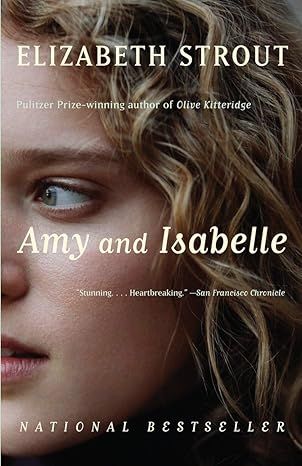
Amy and Isabelle: A novel
4.3
-
9,403
$3.34
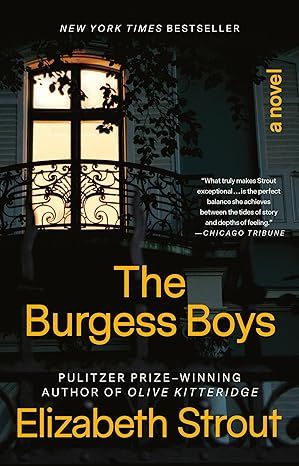
The Burgess Boys: A Novel
4.1
-
11,063
$2.11
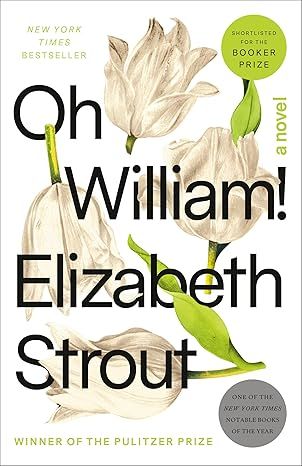
Oh William!: A Novel
4.2
-
22,498
$5.04
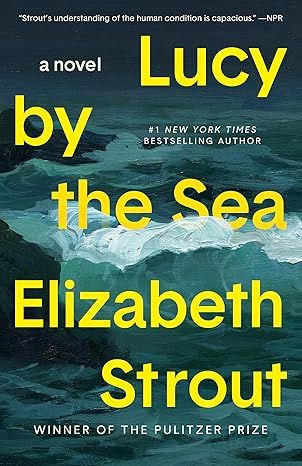
Lucy by the Sea: A Novel
4.3
-
18,461
$4.00
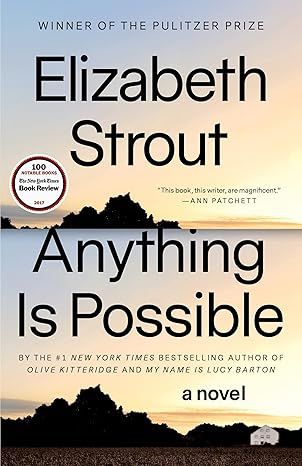
Anything Is Possible: A Novel
4
-
19,323
$5.35
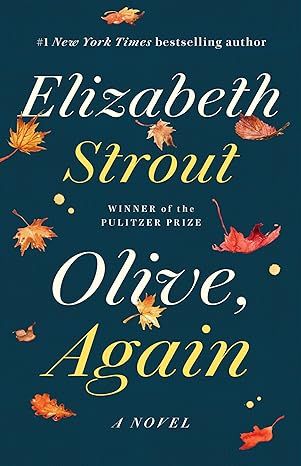
Olive, Again: A Novel (Olive, 2)
4.4
-
24,861
$9.76
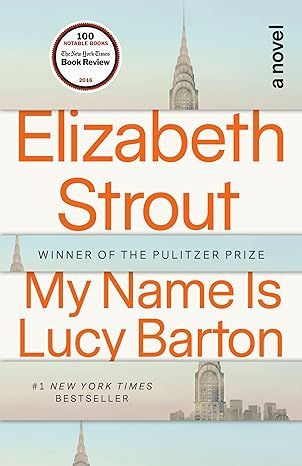
My Name Is Lucy Barton: A Novel
3.8
-
36,168
$7.94
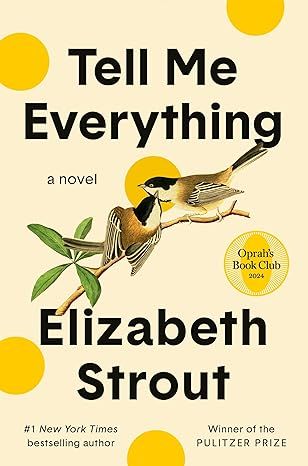
Tell Me Everything: Oprah's Book Club: A Novel
4.5
-
2,665
$14.99
Best Sellers

The Tuscan Child
4.2
-
100,022
$8.39

The Thursday Murder Club: A Novel (A Thursday Murder Club Mystery)
4.3
-
155,575
$6.33

Sapiens: A Brief History of Humankind
4.6
-
140,302
$13.49

The Butterfly Garden (The Collector, 1)
4.3
-
88,556
$9.59

Things We Hide from the Light (Knockemout Series, 2)
4.4
-
94,890
$11.66

The Last Thing He Told Me: A Novel
4.3
-
154,085
$2.99

The Perfect Marriage: A Completely Gripping Psychological Suspense
4.3
-
143,196
$9.47

The Coworker
4.1
-
80,003
$13.48

First Lie Wins: A Novel (Random House Large Print)
4.3
-
54,062
$14.99

Mile High (Windy City Series Book 1)
4.4
-
59,745
$16.19

Layla
4.2
-
107,613
$8.99

The Locked Door
4.4
-
94,673
$8.53
